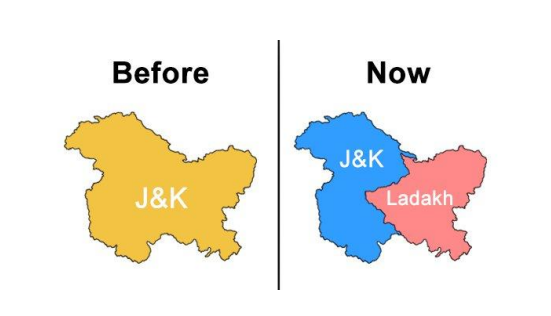
The reorganization of Jammu and Kashmir in August 2019 aimed to address regional aspirations by abrogating Article 370, which provided special autonomy to the region. The state was bifurcated into two Union Territories: Jammu and Kashmir, and Ladakh. This move was intended to integrate the region more closely with the rest of India, promising better governance, development, and security. While some residents, particularly in Jammu and Ladakh, welcomed the changes hoping for more equitable development and increased government investment, there has been significant opposition and unrest, especially in the Kashmir Valley. Critics argue that the reorganization has led to increased military presence, curtailment of civil liberties, and a sense of disenfranchisement among many Kashmiris. Overall, while the reorganization has addressed some regional aspirations for integration and development, it has also intensified feelings of alienation and conflict, indicating that a balanced and inclusive approach is essential for long-term stability and harmony in the region.
Contents
Introduction
The reorganization of Jammu and Kashmir (J&K) by the Indian government in August 2019, through the abrogation of Article 370 and the bifurcation of the state into two Union Territories (Jammu & Kashmir and Ladakh), was a significant move aimed at addressing various political, administrative, and developmental issues.
Body

Positive Development :
- Political Integration:
○ The abrogation of Article 370 and the reorganization were intended to fully integrate J&K with the rest of India, thereby eliminating the special status that was seen by some as a barrier to integration and development.
○ This move was aimed at ensuring uniformity in the application of laws and policies across the country. - Economic and Developmental Initiatives:
○ The central government has initiated various development projects in the region, focusing on infrastructure, healthcare, education, and tourism.
○ Increased investment and economic packages were announced to boost the local economy and generate employment opportunities. - Security and Governance:
○ Enhanced security measures were implemented to curb militancy and ensure peace and stability.
○ The administrative reorganization aimed to improve governance by bringing it directly under central oversight, thus purportedly reducing corruption and inefficiency.
Challenges and Criticism
- Political Discontent and Alienation:
○ A significant portion of the local population, especially in the Kashmir Valley, perceives the abrogation of Article 370 as a breach of trust and an attack on their autonomy and identity.
○ The political mainstream in J&K, including traditional parties like the National Conference and the People’s Democratic Party, have opposed the reorganization, arguing that it undermines democratic processes and local representation. - Human Rights and Civil Liberties:
○ The immediate aftermath of the reorganization saw extensive security lockdowns, internet shutdowns, and detention of political leaders, which have been criticized both domestically and internationally.
○ Restrictions on civil liberties have led to significant unrest and resentment among the population. - Lack of Political Representation:
○ The Union Territory status means reduced legislative power compared to a full state, leading to concerns about the dilution of local governance and representation.
○ Elections to the J&K Legislative Assembly have been delayed, leaving the region under direct central rule for an extended period. - Cultural and Regional Aspirations:
○ The people of Ladakh, while generally supportive of the Union Territory status, have raised demands for constitutional safeguards to protect their cultural and environmental interests.
○ The Jammu region has its own set of aspirations and grievances, often feeling neglected in the political discourse dominated by Kashmir-centric issues.
Conclusion:
The long-term success of this reorganization in addressing the aspirations of the people of J&K will largely depend on the restoration of political processes, safeguarding of civil liberties, and tangible improvements in economic and social development. Dialogue with local stakeholders and a sensitive approach to the unique cultural and political dynamics of the region will be crucial in achieving a sustainable and peaceful resolution to the issues facing J&K.
In case you still have your doubts, contact us on 9811333901.
For UPSC Prelims Resources, Click here
For Daily Updates and Study Material:
Join our Telegram Channel – Edukemy for IAS
- 1. Learn through Videos – here
- 2. Be Exam Ready by Practicing Daily MCQs – here
- 3. Daily Newsletter – Get all your Current Affairs Covered – here
- 4. Mains Answer Writing Practice – here

